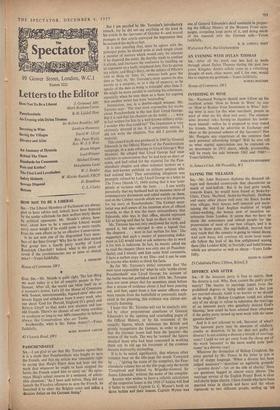PASSCHENDAELE
SIR,—I a,m glad to see that Mr. Terraine agrees that it is a myth that Passchendaele was fought to save the French, and that my article was 'absolutely right in saying that Haig's Diary does not, bear out the myth that whenever he ought to have stopped the battle the French urged him to carry on.' He epito- mises Haig's actual reasons in a sentence, of admir- able clearness : 'As I have said before, Haig did not launch the Flanders offensive to save the French; he launched it to clear the Belgian coast and inflict a decisive defeat on the German Army.' But I am puzzled by Mr. Terraine's introductory remark, for he did not say anything of the kind in his article in the Spectator of October 4—and several passages in that article conveyed the impression that he accepted the myth as fact.
It is also puzzling that, since he agrees with the principal point, he should write at such length about a number of matters which would only be relevant if he disputed the point. He thereby tends to confuse it afresh, and increases the confusion by building up an argument on a badly misplaced date. For he quotes my article, and Haig's diary, on the subject of Main's visit to Haig on 'June 16,' whereas both gave the date as 'July 16.' Mr. Terraine's error cannot be due merely to a misprint, or to a slip of memory, as he speaks of the date as being 'a fortnight' after Junc 2. He might be more careful in verifying his references, especially when he uses them as a basis for arguing that another writer has been 'misleading.' Insinuation, too, is a double-edged weapon. Mr. Tcrraine says : 'The man most responsible for myths about Passchendaele is the late Earl Lloyd George. But it is said that his chapters on the battle . . . were in fact written for him by a well-known military critic. I wonder who that could be?' The imputation is very obviously directed at me. It is completely untrue. I did not write the chapters. Nor did I provide the material.
This absurd myth was produced in 1949 by General Edmonds in the Official History of the Passchendaele campaign, in a note referring to Lloyd George's War Memoirs. He alleged that Lloyd George had once told him in conversation that 'he had kept no diary or notes, and had relied for the material for the Pass- chendaele chapter and other technical matters on a then well-known publicist on military subjects who had assisted him.' That astonishing allegation was promptly refuted by Lady Lloyd George in a letter to The Times (March 15, 1949) stating that it was 'com- pletely at variance with the facts. . . . I can testify personally that my husband had an immense store of contemporary documents and relied mainly on these, and on the Cabinet records which were at his disposal, for his story of Passchendaele.' The Cabinet secre- tariat was well aware of his immense store of official records, so that it was the more extraordinary that Edmonds, who was in that office, should represent LG as having said that he 'kept no diary or notes.'
Mr. Terrainc has not only swallowed the myth, and spread it, but also enlarged it—into a legend that 'the chapters . . . were in fact written for him.' The suggestion that such a master of penetrating indict- ment as LG would need or ask someone else to word it for him is ludicrous. In fact, he merely asked me to read the chapter (there was only one on Passchen- daele), and I merely sent him some brief comments. I have a carbon copy in my files—and it can be seen by anyone who wishes to check the facts.
As for Mr. Terraine's initial comment that 'the man most responsible for' what he calls 'myths about Passchendaele' was Lloyd George, his account of the battle was not published until 1934. Mr. Terraine does not seem aware that for seventeen years before that a stream of evidence about it had been pouring out, and that, apart from a few senior officers who were remote from the battlefield or personally impli- cated in the planning, this evidence was almost uni- versally damning.
I hope that Mr. Terraine will not be similarly mis- led by other preposterous assertions of General Edmonds's in the opening and concluding pages of the Official History, or by his treatment of the casualty figures, which minimises the British and grossly exaggerates the German, in order to prove that the German losses had been the heavier—the reverse of the truth. The way he 'cooked' the figures shocked those who had been concerned in working • them out. In old age his treatment of the evidence became deplorably misleading.
It is to be noted, significantly, that whereas other volumes bear on the title-page the words 'Compiled by . . ; (giving the name of the compiler), the Pass- chendaele volume has on the title-page only the words 'Completed and Edited by Brigadier-General Sir James Edmonds,' without the name of the compiler. Anyone who wishes to have a reliable calculation of the respective losses in the 1916-17 battles will find it better to consult Captain G. C. Wynne's book on those battles and their lessons. Captain Wynne was one of General Edmonds's chief assistants in prepar- ing the Official History of the Western Front cam- paigns, compiling large parts of it, and doing much of the research into the German side.—Yours faithfully,














































 Previous page
Previous page